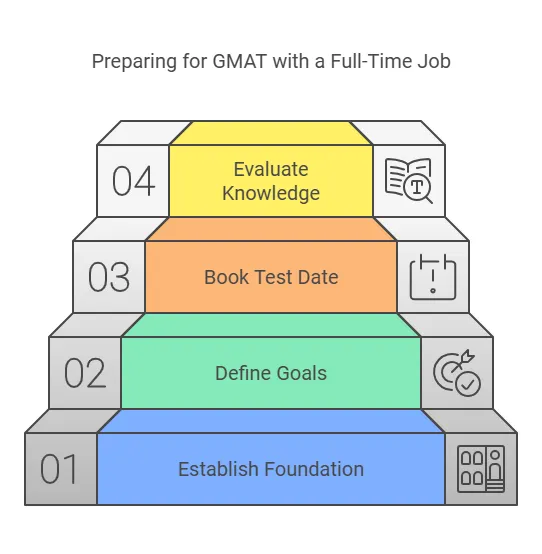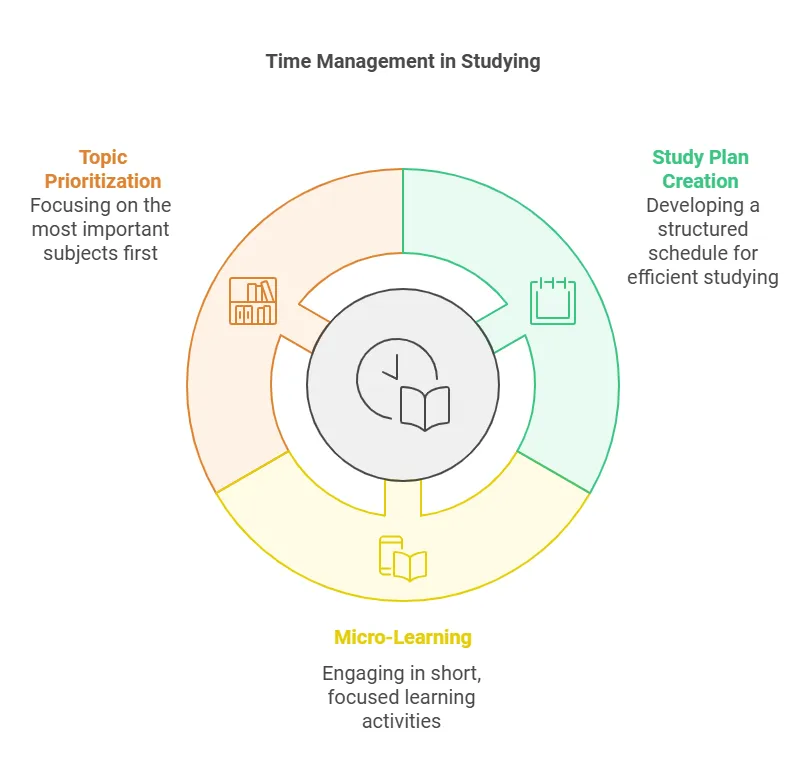How to Study for GMAT with a Full Time Job | A Comprehensive Guide
It might be thought that balancing a full time job with GMAT preparation is nearly impossible. But the thing is that proper planning, constant effort, and correct strategies will help one overcome this difficulty. Find out how to study for GMAT with a full time job with the right plan of action. This guide outlines practical strategies to help you prepare for the GMAT while maintaining your work responsibilities. By managing your time effectively, using the right resources, and staying consistent, you can achieve your desired GMAT score.
“The difference between ordinary and extraordinary is that little extra” — Jimmy Johnson

Setting the Foundation
The first step in preparing for the GMAT with a full time job is to establish a solid foundation. Here’s how:
👉Define Clear Goals
Set a Target Score: Decide on a realistic yet ambitious GMAT score based on your MBA goals.
Identify Strengths and Weaknesses: Use a diagnostic test to pinpoint areas that need more attention.
👉Book a Test Date
Commit to a Deadline: Choose a test date 3–6 months ahead to create urgency and structure in your preparation.
Plan Backwards: Build your study schedule based on the time left before the test.
👉Evaluate Your Current Knowledge
Take a diagnostic test to assess your starting point and adjust your study plan accordingly.

Time Management Strategies
With limited hours available, managing your time efficiently is crucial.
👉Create a Personalized Study Plan
Daily Study Routine: Dedicate at least 1–2 hours daily for GMAT prep—one hour in the morning and another in the evening.
Weekend Sessions: Use weekends for longer study sessions, mock tests, and in-depth reviews.
👉Leverage Micro-Learning
Study during commutes, breaks, or idle time using flashcards or mobile apps.
Break down topics into small, manageable sections to fit into short study periods.
👉Prioritize High-Yield Topics
Focus on Quantitative and Verbal sections, as they have the most significant impact on your score.
Allocate more time to your weaker areas to build confidence and proficiency.

Resource Optimization
The right resources play a crucial role in successful GMAT preparation. High-quality materials, adaptive tools, and credible guides ensure focused learning, helping you master challenging topics and boost your confidence for exam day. Invest wisely in the best study resources to optimize your performance and achieve your target score.
👉Choose the Right Prep Tools
Use reputable resources like the GMAT Official Guide, Manhattan Prep, or e-GMAT for comprehensive coverage.
Subscribe to platforms like GMAT Club or GMAT Point for daily practice and video solutions.
👉Practice Mock Tests
Schedule full-length mocks at least twice a month to simulate test conditions.
Evaluate your performance regularly to spot patterns, pinpoint weaknesses, and adjust your preparation strategy for continuous improvement and better results.
👉Organize Study Material
Keep all resources—books, notes, and practice tests—in one place for easy access.
Maintaining Consistency
Consistency is key to steady progress.
👉Set a Daily Routine
Morning Sessions: Use fresh morning energy for intensive activities like solving problem sets.
Evening Sessions: Focus on revising and practicing known concepts after work.
👉Avoid Procrastination
Stick to your schedule, even on days when motivation wanes.
Divide larger tasks into smaller, manageable goals to sustain progress and maintain motivation throughout your preparation journey.
Coping with Work and Study Stress
Balancing work and study can be stressful, but these strategies can help.
👉Adopt a Healthy Lifestyle
Prioritize sleep, exercise, and a balanced diet to maintain focus and energy.
Use mindfulness techniques, such as meditation, to reduce anxiety.
👉Communicate at Work
Inform your manager about your GMAT preparation if possible.
Request flexible work hours or reduced responsibilities if your job allows.
👉Take Regular Breaks
Study for 25 minutes, then take a 5-minute break.
Common Pitfalls to Avoid
Avoid these mistakes to stay on track:
Skipping Difficult Topics: Don’t avoid challenging areas, as they may significantly impact your score.
Burning Out: Overloading your schedule can lead to fatigue and reduced efficiency.
Using Low-Quality Materials: Rely only on trusted GMAT prep resources.
Sample Study Plan for Working Professionals
Monthly Goals
- Month 1: Learn basics of Quantitative and Verbal sections; take your first mock test.
- Month 2: Focus on advanced topics like geometry and critical reasoning.
- Month 3: Take regular mocks; focus on weak areas and refine strategies.
Weekly Routine
| Day | Morning (1 Hour) | Evening (2 Hours) |
|---|---|---|
| Monday | Quant Practice | Verbal Practice |
| Tuesday | Verbal Practice | Quant Review |
| Wednesday | Critical Reasoning | Integrated Reasoning Practice |
| Thursday | Quant Problem Solving | Sentence Correction Practice |
| Friday | Review Mock Test Mistakes | Light Revision |
| Saturday | Full-Length Mock Test (3 hours) | Analyze Mock Results (2 hours) |
| Sunday | Revise Weak Areas | Prepare for Next Week |
Success Stories
Draw inspiration from people who, while working, learned to excel in the GMAT. Such people have managed to show that balancing the rigorous schedule of work with productive studying is achievable. They come up with innovative approaches including time-blocking, utilizing commutes to study, and pinpointing areas of emphasis through the syllabus. As their stories unfold, these individuals portray the use of discipline, creativity, and using resources efficiently. From them, you can learn to adapt various practical tips that would optimize productivity and motivation and turn preparation for the GMAT into something manageable and rewarding even if you have a hectic routine.
Conclusion | How to Study for GMAT with a Full Time Job
Balancing GMAT preparation with a full time job is challenging but achievable with strategic planning and consistent effort. By setting clear goals, managing your time effectively, and staying committed, you can excel on the GMAT while maintaining your professional responsibilities.


